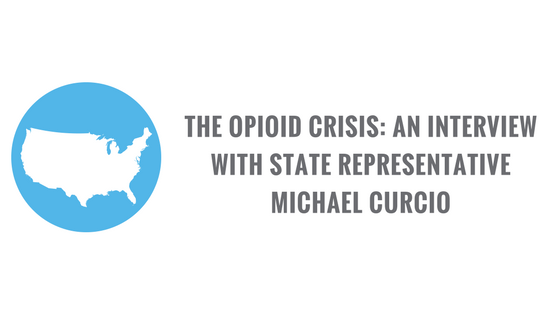The Opioid Crisis: An Interview with State Representative Michael Curcio
March 28, 2018 •Olivia Hebner

In the third post of this blog series, we sat down with Tennessee State Representative Michael Curcio to discuss the opioid epidemic. Representative Curcio is the Vice Chair of Tennessee’s Criminal Justice Committee (House).
Previously, we gave an overview of the opioid crisis and how data can be used in the opioid litigation cases. For this post, we took a step back to understand more about how the epidemic started in the first place and what steps should be taken from here.
Tennessee State Representative Michael Curcio, R-Dickson, compares the opioid epidemic to a cruise ship, rather than a speed boat. While we would like to quickly right the ship, this massive and widespread problem will take time and persistence to return to the proper course. To make matters worse, the ship has been off course for a very long time.
From his perspective, several reinforcing trends and events have combined to set the conditions for this national crisis. Consequently, no single reform is likely to fix it. Sam Quinones, the author of Dreamland: The True Tale of America’s Opiate Epidemic cites a 1980 letter by Dr. Hershel Jick noting the lack of addiction in patients who were prescribed narcotic painkillers. In the wake of this letter, some pharmaceutical companies used it, perhaps misleadingly, to claim that addictive painkillers were safe. Additionally, in 2001, Joint Commission’s Pain Management Standards added pain as the “fifth vital sign,” which paved the way for a marked increase in legitimate opioid prescriptions. Finally, the criminal sale of black tar heroin from Mexican drug cartels helped fuel the crisis, according to Quinones. All serve as contributing factors toward the opioid epidemic.
“No one started taking opioids to achieve happiness; they are trying to dull their pain, either physical or mental,” Curcio said. As a lawmaker, Rep. Curcio has heard countless stories of unsuspecting individuals who planned to use these medications to treat workplace injuries for a few days and ended up continuing to use them for months or even years.
Considering the many causes, Tennessee views combating the opioid crisis as a three-prong approach:
- Prevention: How do people encounter these drugs?
- Treatment: How can we help the people who are already addicted?
- Law enforcement: How do we crack down on the criminal cartels that are distributing?
As a component of the treatment prong, Rep. Curcio recently filed House Bill 1929, known as the Stopping Addiction & Fostering Excellence (SAFE) Act, which tightens standards for recovery homes, making sure they are providing proper care.
To turn this seemingly insurmountable crisis back on the right course, many reinforcing approaches will be needed.
Summit’s Litigation Analytics team specializes in supporting counsel and expert witnesses in various matters involving data and analytics. If you’re interested in how Summit can support you and your team, please contact Corey West at corey.west@summitllc.us.
Get Updates
Featured Articles
Categories
- affordable housing (12)
- agile (3)
- AI (4)
- budget (3)
- change management (1)
- climate resilience (5)
- cloud computing (2)
- company announcements (15)
- consumer protection (3)
- COVID-19 (7)
- CredInsight (1)
- data analytics (82)
- data science (1)
- executive branch (4)
- fair lending (13)
- federal credit (36)
- federal finance (7)
- federal loans (7)
- federal register (2)
- financial institutions (1)
- Form 5500 (5)
- grants (1)
- healthcare (17)
- impact investing (12)
- infrastructure (13)
- LIBOR (4)
- litigation (8)
- machine learning (2)
- mechanical turk (3)
- mission-oriented finance (7)
- modeling (9)
- mortgage finance (10)
- office culture (26)
- opioid crisis (5)
- Opportunity Finance Network (4)
- opportunity zones (12)
- partnership (15)
- pay equity (5)
- predictive analytics (15)
- press coverage (3)
- program and business modernization (7)
- program evaluation (29)
- racial and social justice (8)
- real estate (2)
- risk management (10)
- rural communities (9)
- series - loan monitoring and AI (4)
- series - transforming federal lending (3)
- strength in numbers series (9)
- summer interns (7)
- taxes (7)
- thought leadership (4)
- white paper (15)


